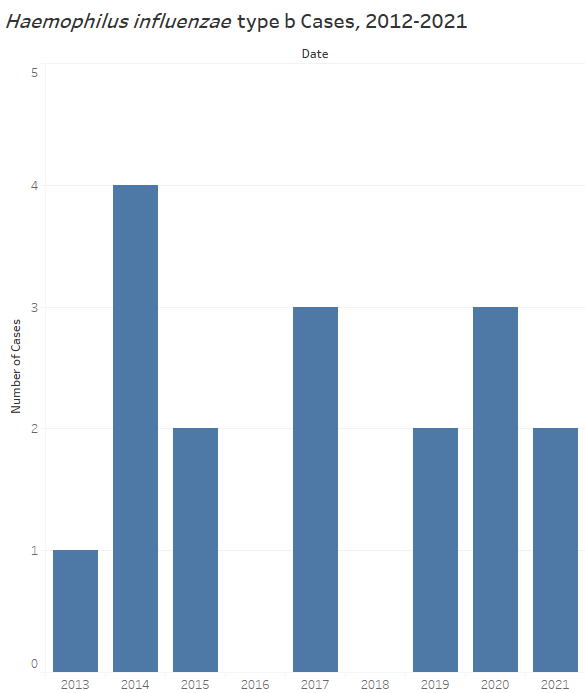Haemophilus influenzae type b (Hib)
Definition
Haemophilus influenzae type b (Hib) is a disease caused by a bacterium. It causes several kinds of severe illness, including meningitis, pneumonia, and airway obstruction. Hib can be unpredictable and cause different illnesses in different people, including death. It is most common in unvaccinated infants less than two years old.
Hib is reportable to the Iowa Department of Public Health by Iowa Administrative Code 641 Chapter 1.
Symptoms
Symptoms commonly appear between two and four days. Symptoms may include (depending on where a person is infected):
- Fever
- Vomiting
- Difficulty breathing
- Middle ear infection
- Bronchitis
Children infected with Hib may get seriously ill very quickly.
Causes
Hib is caused by breathing in bacteria carried on droplets from other people’s coughs and sneezes. The most common place it enters the body is through the nose.
Once inside the body, Hib can act in different ways causing a variety of illnesses. If the bacteria stays in the nose or throat, it may cause infections there, but if it spreads throughout the body, it can cause more serious disease such as brain or blood infections.
Risk Factors
The biggest risk factor for getting Hib is not receiving the vaccine for it as a baby. There is a very good Hib vaccine available and if given according to a proper schedule, the risk of Hib is very small.
Prevention
The best way to prevent Hib is to get vaccinated with Hib-containing vaccine. Click here for the Bureau of Immunization. In addition:
- Keep children up to date on their immunizations. By five years of age, the risk of Hib is almost nonexistent, except in people with immunity problems. Adults normally don’t have to worry about getting sick from Hib.
- Hand washing is important for preventing all illnesses including Hib.
- Cover your mouth and nose when you cough or sneeze.
- Avoid others when coughing.
- In general, children should stay home when they are sick. If a person is diagnosed with Hib or is a contact to a known case of Hib and has symptoms, they should stay home until at least 24 hours after starting an appropriate antibiotic.
Treatment
- An appropriate antibiotic can be given to stop people from carrying the disease if they are ill.
- Antibiotics are also used to treat people who have been exposed to Hib, especially those who live with someone with Hib.
- Fluids, rest, and observation of ill children with Hib is important.
- Children diagnosed with Hib and their close contacts still need to be sure to receive all of their proper immunizations.
Statistics
Cases of Haemophilus influenzae type b (Hib) invasive disease are rare in Iowa and the US today. In 1991, Hib vaccine was recommended for all infants after age 2 months. Since then, the incidence of Hib in children less than 5 years of age declined by greater than 99 percent. In 2021, there were 2 cases of Hib reported in Iowa.
For more detailed information and statistics on all notifiable diseases, please see our current annual report located in the reports section of the CADE homepage.

Additional Resources
Public
Public Health
Schools
Business and Childcare
Health Care Providers